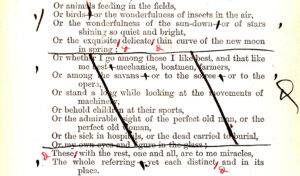To Rewrite or Not to Rewrite
I love reading books about writing. I love workshops. I love classes and seminars. I love being in a room with other writers, learning a fresh new way to bring my stories to life on the page.
What I don’t love is how I feel about pretty much everything I’ve ever written after said books, workshops, classes, and seminars. Why? Because here I am in a class, untying the knot of my writing and realizing not just that something is not working in a scene, but finally understanding why it’s not working. Then I realize the thing that’s not working in that scene is why this scene, and this one, and oh this one too, isn’t working. It’s systemic!
One of the most important things we do as writers is continue to learn our craft. As much art as there is on the page, there is just as much, if not more, craft helping to bring that art to a new level. So this isn’t an article about scrapping classes and seminars because we as writers need these forays into the depths of our ability to create.
It’s about what we do when we know there’s a problem with a work we thought was finished, a problem we now know how to fix.
Eager interviewer: “Do you ever read your books after they’ve been published?”
Author (face resembling that of someone attempting to be nice to a person who has set a plate of drowned worms in front of them and encouraged them to “eat up”): “Well, you know…no.”
Internal Author response: “It is very clear to me that you have never, not once, had something published. Because if you had, you would know that the idea of re-reading something when there is no way I can fix all the thousands of things I would find wrong with it would fall somewhere lower on the list than cleaning beneath my car seats with my tongue. And I have a toddler. And a dog.”

That one time Superman was asked to re-read.
We have a job where nothing is ever truly finished, in the sense of “Well, that’s absolutely as good as it’s ever going to get, and at no time in the future will I ever think it could be any better.” But obviously books get turned in and published. Where do you halt the re-writes within the realm of “never really finished”?
There doesn’t seem to be much middle ground in the answers I’ve gotten to this question from writer friends, and these are writers with successful careers and, in some cases, NYT bestsellers under their belts. Pretty much all of them say “Use what you’ve learned in your class in your next book. Turn the ‘finished’ one in.”
90% of me totally and completely agrees with them.
It’s that 10% that keeps screaming and throwing trash cans across the alley under my window at two in the morning. That 10% is the worst soccer fan on the planet.
So I re-write.
But why does that 10% win out over the very wise and correct thinking of the 90%? Because I know I’m not alone here.
A writer friend recently said she’s come to believe people who teach workshops don’t teach them to show writers how to be better writers—they teach them to get the writers to come to the next workshop. We laughed and we certainly don’t think that’s the sole motivation of teachers the workshop-world over, but that feeling in writers, that “There’s still something wrong with this story” feeling that does drive us to take classes forever, whatever that feeling is is very, very real and is much more responsible for many seminar sign-ups than anything else. It’s also what drives all these re-writes.
Turns out this article isn’t about the dilemma we face every time we learn something new about writing. No, this article is really about fear. Fear of turning something in that isn’t perfect, that someone could find fault in, that could get rejected, which we could see coming, because see all those flaws?!

This is Walt Whitman, people. Case closed.
That may be the biggest reason why nothing is ever “done.”
So to re-write or not to re-write?
The answer to that question doesn’t lie in what we do or don’t know about our craft. It isn’t found in our finally reaching such a pinnacle of perfection we disappear in a pink cloud of enlightenment.
It lies in the ability to say “This is good enough” and to be satisfied in that.
And the most important part of that sentence is not “good enough”—it’s “satisfied.”
There’s so much work to do behind that one word. It doesn’t mean “settle” or “I can’t make this piece any better”; it doesn’t have anything to do with the piece. “Satisfied” means “I am happy with who I am as a writer.” That is a crucial distinction. I may never be satisfied with a certain piece—it may need more work on the theme, the emotional arc, whatever. But I can be dissatisfied with a piece and still be satisfied with myself as the creator of that piece.
Fear is necessary, because it’s what drives us to write better and better stories. But there needs to be a healthy balance between fear and satisfaction and there are times when it’s out of balance. At those times, and we all find ourselves there, we have to look outside the piece, outside ourselves as writers, and root out the source of the fear.
When you do that, you’ve added yet another dimension to your ability to tell stories. The saying over the entrance to the temple of the Oracle at Delphi said “Know thyself.” Knowing the depth of our fears is the source of the depth in our stories. And creating a story with depth is truly satisfying.
